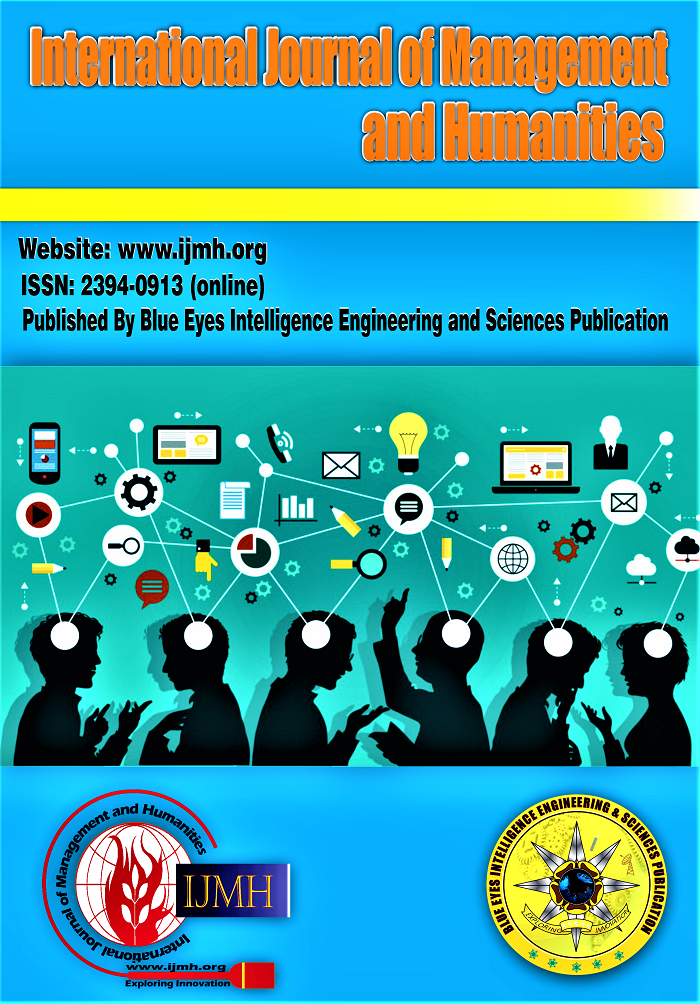Study of Consumer Buying Behavior towards Bicycle under EPS and LPS
Main Article Content
Abstract
The buying behaviour towards the bicycle is studied by the theoretical knowledge of EPS and LPS. The basics of consumer behaviour is analyses statistically to gather different influential factors. The Sequence of EBM model is also used to understand the theory for forwarding the study to the statistical mode. The historical background of the bicycle and product differentiation are structured to findout the result. The SPSS is used to study the correlation and Chi-square of difference variables. Chi-square test we conclude that there is significant relationship between the purchase of bicycle and the income level of the customers. Chi-square test we conclude that there is significant relationship between the purchase of bicycle and the Gender of the customers. There is more significant influence of the consumer behaviour in his purchase decision, where out of 10 variables, 7 variables are found significant towards the theory.
Downloads
Article Details
Section
How to Cite
References
www.herocycles.com
www.atlascycles.co.in
www.avoncycles.com
www.bsahercules.com
www.la-sovereign.com
www.firefoxbikes.com
www.tiindia.com
www.machcity.com
https://www.indianmotorcycle.in/roadmaster/
Prakash, S .2010. Theory of Consumer Behaviour: 1st Edition, Vikash Publishing House Pvt. Ltd, Page no. 229.
Kotler, Philip. 2000. Marketing Management:Analysis, Planning, Implementation and Control,10th Edition, New Delhi: Prentice-Hall of India.
Januszewski, F. (2011). Possible applications of instruments of measurement of the customer value in the opera.
tions of logistics companies. Scientific Journal of Logistics. Vol. 7, Issue 4, No 2, 17 – 25
Chatain, O. & Zemsky, P. (2011). Value creation and value capture with frictions. Strategic Management Journal, Vol. 32, No. 11, 1206–1231. doi: http://dx.doi.org/10.1002/smj.939’
Nirav B. Halvadia, Kedar Bhatt, Mahendra Sharma, Anil Sharma, Soumyakant Dash (2022). Consumers’ intention to use bicycle-sharing services: The role of consumer consciousness. Cleaner and Responsible Consumption, 7 (2022) 100076, 2666-7843, Elsevier Limited.
Zhuang, W., Luo, X., Riaz, M.U., 2021. On the factors influencing green purchase intention: a meta-analysis approach. Front. Psychol. 12 (1), 644020 https://doi.org/ 10.3389/fpsyg.2021.644020.
Tan, L.L.,(2022). Understanding consumers’ preferences for green hotels–the roles of perceived green benefits and environmental knowledge. Journal of Hospitality and Tourism Insights. https://doi.org/10.1108/JHTI-01-2022-0038
Kim, Y., (2002). The Impact of Personal Value Structures on Consumer Pro-environmental Attitudes, Behaviors, and Consumerism: A Cross-Cultural Study. Michigan State University.
Prakash, S .2010. Theory of Consumer Behaviour: 1st Edition, Vikash Publishing House Pvt. Ltd, Page no. 204-205.
Ihsan, M., R, Prof. Dr. H. M. R., Setiawati, Dr. R., & Zamzami, Dr. (2022). Analysis of Business Management Regional Public Company (Perumda) Drinking Water in Jambi Provinc. In International Journal of Recent Technology and Engineering (IJRTE) (Vol. 11, Issue 3, pp. 45–53). https://doi.org/10.35940/ijrte.c7254.0911322
Effects on Consumer Behavior Due to Post Purchase Regret Associated with Online Shopping. (2019). In International Journal of Innovative Technology and Exploring Engineering (Vol. 8, Issue 11S, pp. 548–555). https://doi.org/10.35940/ijitee.k1092.09811s19
Onegina, V. (2019). Informational Support of Cash Flow Management Processes in Public Administration. In International Journal of Innovative Technology and Exploring Engineering (Vol. 8, Issue 11, pp. 2836–2841). https://doi.org/10.35940/ijitee.k2401.0981119
Saflow, A., Aldarwish, Dr. M., & Khadija, Dr. H. (2023). The Impact of Modern Crisis Management Strategies on Crisis Management Planning. In International Journal of Management and Humanities (Vol. 9, Issue 7, pp. 12–21). https://doi.org/10.35940/ijmh.f1578.039723
Sachdeva, Dr. R. (2020). Marketing Implications of Information Processing: Literature Review and Directions for Future Research. In International Journal of Management and Humanities (Vol. 5, Issue 4, pp. 10–18). https://doi.org/10.35940/ijmh.c1182.125420





